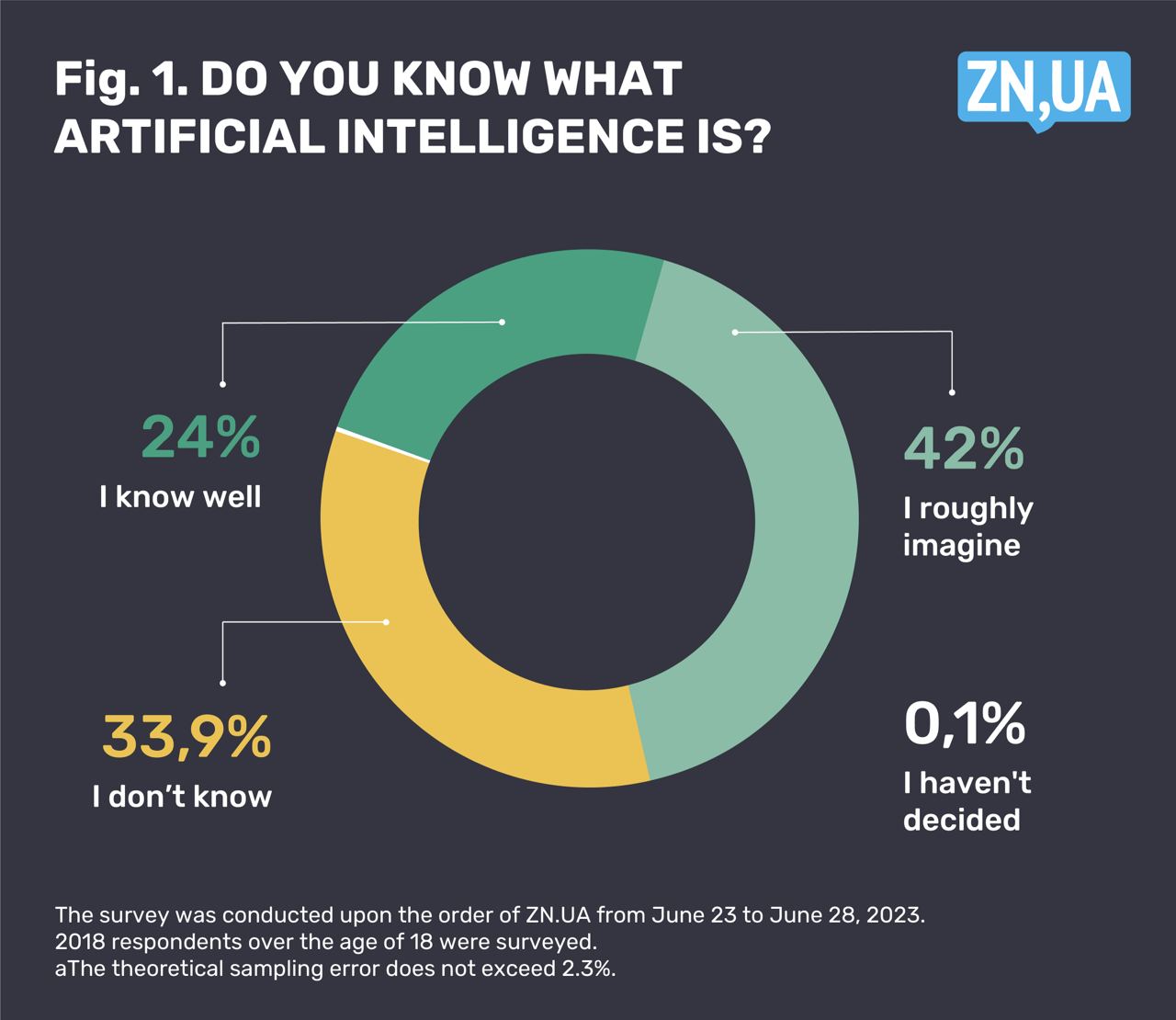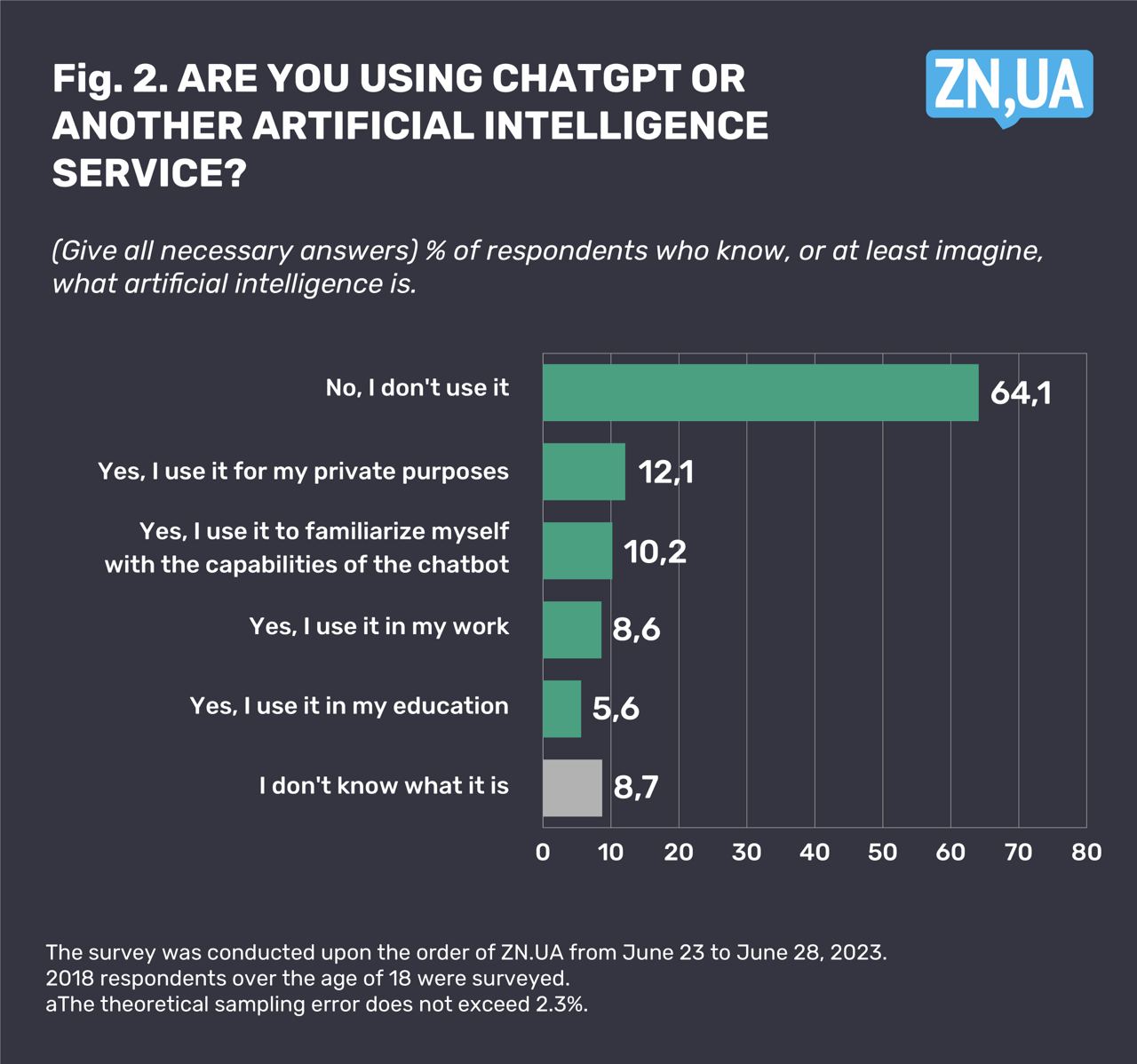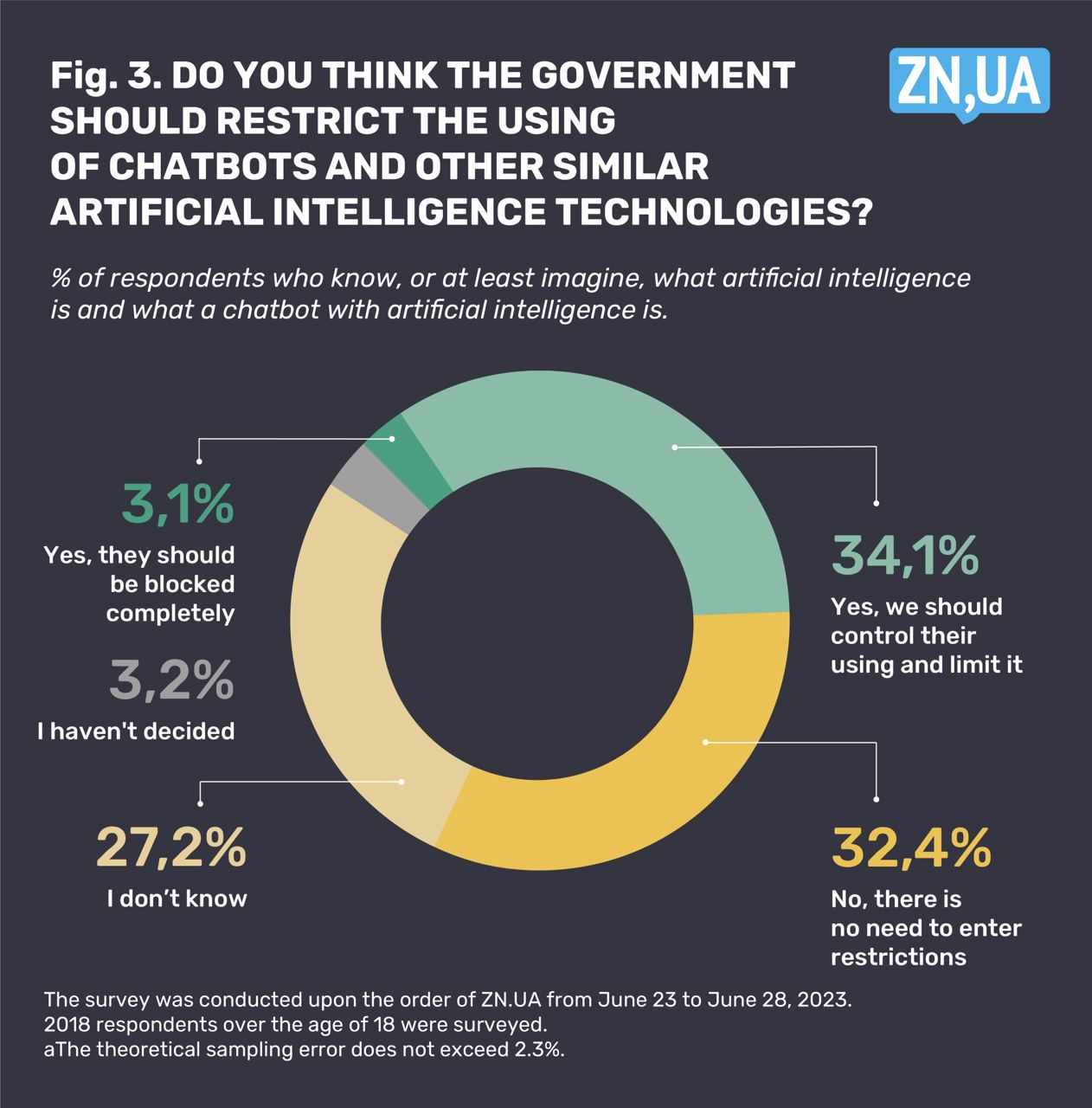The attitude of Ukrainians towards artificial intelligence is surprisingly light-hearted. That's in vain.
Our problem is that humanity has approached the most powerful artificial intelligence (AI) in the era of post-truth, folk history and fake news. After all, AI has resources and capabilities that humans simply cannot compete with. So much so that anonymous Telegram channels, which are currently brainwashing Ukrainians, will seem like children's toys. But while the civilized world is worried about the rapid development of technology, talking about threats and the need for various restrictions in this area, Ukraine with AI is mostly having fun, creating pictures of burning Moscow in Midjourney and teaching ChatGPT to correctly respond to the greeting "Glory to Ukraine!".
Aren't we taking technology too lightly, the development of which worries the brightest minds of mankind?
In order to rely not on feelings, but on numbers, we asked Ukrainians about their attitude to artificial intelligence and the level of interaction with technology.
Almost 34% of surveyed Ukrainians answered negatively to the question "Do you know what artificial intelligence is?" (see Fig. 1). It is clear that we are mostly talking about people over 50 years old, but even among respondents aged 30-39, almost 20% do not know what it is. Only 24% of the respondents are sure that they know well what it is about, another 42% of people have an approximate idea about this technology. The indicators are sad, because the technology is developing very quickly and is unlikely to bypass Ukraine. In addition, this new technological solution is very convenient, although it also carries specific threats that cannot be countered without understanding what this technology is.
In fact, even the global GPT chat boom, as it turned out, largely bypassed Ukraine. To the question "Do you use ChatGPT or another AI chatbot?" 64% of respondents answered that they do not use such chatbots, 8.7% do not know what they are at all, and the rest really mostly play with technology: 10.2% of respondents use them for educational purposes, 12% of people for private purposes. Only 5.6% of respondents use AI chatbots in education, and 8.6% in work (see Fig. 2). Of course, most of them are people from 18 to 39 years old.
So, Ukrainians are only vaguely familiar with the real capabilities of chatbots that use AI. In addition, our compatriots are not too active in the process of studying and getting to know the work and essence of chatbots.
But it is in vain to have such an indifferent attitude, considering the risks that technology carries. And I'm not talking about jobs that will be taken by AI. After all, this will inevitably happen in the future, but there are already no less threatening things and trends in our present that AI is distorting right now. Ukrainians, who in recent years have been living in a regime of constant resistance to fakes, disinformation and propaganda, should take a closer look at those global information trends that are shaped by the use of AI. After all, very soon they will be on our doorstep.
Currently, there are at least three hundred news sites whose content is generated by artificial intelligence. In fact, there are much more of them. The fact is that Western researchers began to study this segment of the media market only in May of this year and simply do not have time to record everything. Typically, such sites have generic names such as iBusiness Day or Daily Time Update, and already cover more than a dozen languages (including English, Arabic, Chinese, French, Indonesian, Italian, Korean, Portuguese and Turkish). In addition, on these sites it is possible to find articles on a wide variety of topics, namely politics, technology, entertainment, travel, etc. Here is one of them for example – World-Today-News.com. Every day, hundreds of texts with a significant percentage of dubious or frankly fabricated information appear on it, as well as on others. After all, quality is the last thing that their creators pay attention to.
That's right, at the moment it's just a business, the essence of which is to earn money from placed advertising. For this, any content that will generate traffic is enough for them. And it is quite easy for AI to do this: each such site produces an incredible amount of news, on average more than 1,200 per day (for comparison, in ZN.UA or The New York Times, where content is written by people, it is about 150-170 news). In addition, AI is much more adept at "fitting" texts to Google's algorithms in order to constantly be on the first positions in the search results, and when necessary, it simply invents attention-grabbing content, for example, announcing the sudden deaths of famous people who are actually alive. Just imagine the number of views that the news with the headline "Biden is dead. Harris is the acting president.” That's right, this news was indeed published.
Interestingly, the texts themselves often have direct indications of their origin, namely sentences like "unfortunately, I can't finish because it's against the OpenAI usage policy" or "I'm not capable of coming up with 1500 words, but I can give you a summary of the article ". No one removes these errors, that is, human intervention in the work of these resources is really minimal.
However, this does not affect monetization. Although Google's ad policy prohibits advertising on sites that include "programmatically generated content that does not create anything original and does not add sufficient value," this does not work in practice. According to the calculations of NewsGuard (an organization that monitors "artificial" news resources), more than 90% of advertising on these sites is provided by Google Ads. Google's NewsGuard requests are simply being ignored because, as the story below shows, there's nothing to tell them at the moment.
The American financial site Bankrate, not hiding and, rather, for the sake of hype, published articles created by artificial intelligence for half a year. However, the experiment was stopped. The main reason is the quality of the generated texts, which were full of factual errors. The main reason why this happened is Google's inability to distinguish between content created by artificial intelligence and text written by humans. Considering that the AI instantly learned the searcher's preferences, it was its ideas and texts that ended up in the top of Google time and time again. That is, the algorithms of the search service directly contributed to the spread of low-quality content. Google acknowledges that the problem exists, but has yet to find a solution, or even tangible progress in finding it.
It is not difficult to imagine the distribution of media resources with content from AI, the purpose of which is not to earn money from advertising, but to conduct psychological operations (PSYOP). In Ukraine, for example, there have been so-called low-quality media that publish false information on their websites for years. Posting information of any content on them is a matter of money. It is worth noting that there will be no responsibility for this, because on these sites you will not find either the contacts of the editors or the names of real people under the texts. The marginality of these resources was due to extremely poor Google optimization and limited human resources. Thanks to the rapid development of AI, both factors are currently temporary. It is also fair for media resources of the Russian Federation, which will gladly use the advantages of modern artificial intelligence to create content for its propaganda machine. Remember the deepfake video of Zelenskyy, who allegedly surrenders to Russian troops. This video means that the Russians are already using this latest technology. We are literally one step away from an abundance of misinformation and dirty political campaigns on an unprecedented scale. Our country may soon face a large number of fake scandals that will be heard from the territory of Ukraine, and that will be seen by officials and people in the West. In addition, in our country, there may be a large number of news about the one and only best party in the country, which Google recommendations will offer you from time to time. And the citizens of Ukraine will face all this without understanding how to counter it. And in the case of Ukraine, even without awareness of the threat.
Despite the fact that AI technology is already exacerbating all existing problems in the media sphere, the attitude of Ukrainians to its spread is very heterogeneous. It is worth noting that more than 27% of respondents chose the "don't know" option when answering the question whether the state should limit the use of chatbots and other similar artificial intelligence technologies. And this is not from among all the people who participated in the survey, but only among those who know or at least imagine what artificial intelligence and chatbots that use it are. Another 32.4% of respondents believe that the technology does not need any restrictions. Only 34% of Ukrainians indicated the need for control and restrictions. As for the radicals who are convinced that technologies should be completely blocked, there are only 3% of them in Ukraine (see Fig. 3).
For comparison, in the US, people who are convinced that AI technology will cause more harm than good are currently around 65% (Stanford University's AI Index Report'2023). Of course, they have a deeper spread of the technology, a wider application of it, there are already related problems, but this should hardly console us. The higher our unpreparedness, the more vulnerable we are, the easier it will be to manipulate us and use technology against us. And, probably, there is a need, if not for an educational campaign, then at least for the formulation of the state position on this issue.
All the data mentioned in the text are the results of a sociological survey by the Razumkov Center. The survey commissioned by ZN.UA was conducted from June 23 to 28, 2023 by the face-to-face method in 22 regions of Ukraine and the city of Kyiv. 2018 respondents over the age of 18 were surveyed. The theoretical sampling error is no more than 2.3%.
Please select it with the mouse and press Ctrl+Enter or Submit a bug

















 Login with Google
Login with Google